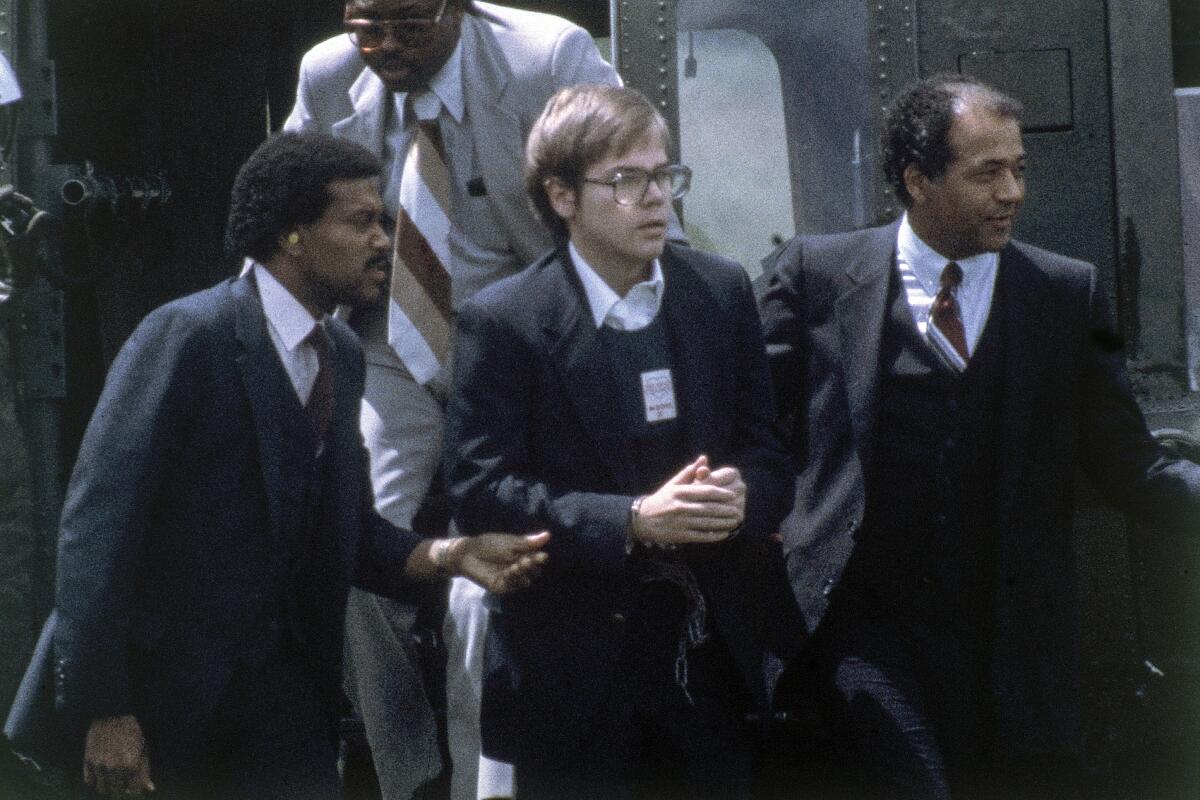John Hinckley Jr. freed from court oversight decades after trying to kill Reagan

- Share via
NORFOLK, Va. — John Hinckley Jr., who shot and wounded President Ronald Reagan in 1981, was freed from court oversight Wednesday, officially concluding decades of supervision by legal and mental health professionals.
“After 41 years 2 months and 15 days, FREEDOM AT LAST!!!” the 67-year-old Hinckley wrote on Twitter shortly after noon.
The lifting of all restrictions had been expected since late September. U.S. District Court Judge Paul L. Friedman in Washington said he would free Hinckley on June 15 if he remained mentally stable in the community in Virginia where he has lived since 2016.
Hinckley, who was acquitted by reason of insanity, spent the decades before that in a Washington mental hospital.
Freedom for Hinckley will include giving a concert — he plays guitar and sings — that’s scheduled for July in Brooklyn. He’s already gained nearly 30,000 followers on Twitter and YouTube in recent months as the judge loosened Hinckley’s restrictions before fully lifting all of them.
But the graying Hinckley is far from being the household name that he became after shooting and wounding the 40th U.S. president — and several others — outside a Washington hotel in a deranged attempt to impress actress Jodie Foster. Today, historians say Hinckley is at best a question on a quiz show and someone who unintentionally helped build the Reagan legend and inspire a push for stricter gun control.
“If Hinckley had succeeded in killing Reagan, then he would have been a pivotal historical figure,” H.W. Brands, a historian and Reagan biographer, wrote in an email to the Associated Press. “As it is, he is a misguided soul whom history has already forgotten.”
Barbara A. Perry, a professor and director of presidential studies at the University of Virginia’s Miller Center, said that Hinckley “would be maybe a ‘Jeopardy!’ question.”
But his impact remains tangible in Reagan’s legacy.
“For the president himself to have been so seriously wounded, and to come back from that — that actually made Ronald Reagan the legend that he became ... like the movie hero that he was,” Perry said.
Reagan showed grace and humor in the face of death, Perry said. After being shot, the president told emergency room doctors that he hoped they were all Republicans. He later joked to his wife Nancy that he was sorry he “forgot to duck.”
When the president first spoke to Congress after the shooting, he looked “just a little bit thinner, but he’s still the robust cowboy that is Ronald Reagan,” Perry said.
The assassination attempt paralyzed Reagan press secretary, James Brady, who died in 2014.
In 1993, President Bill Clinton signed into law the Brady Bill, which required a five-day waiting period for handgun purchases and background checks of prospective buyers. The Brady Campaign to Prevent Gun Violence and the Brady Center to Prevent Gun Violence are named after Brady and his wife Sarah.
The shooting also injured Secret Service agent Timothy McCarthy and Washington Police Officer Thomas Delahanty.
McCarthy told the AP last year that he didn’t “have a lot of good Christian thoughts” about Hinckley.
“But in any case, I hope they’re right,” McCarthy, then 72, said of Hinckley’s impending release from supervision. “Because the actions of this man could have changed the course of history.”
Hinckley was 25 and suffering from acute psychosis when he shot Reagan and the others. When jurors found him not guilty by reason of insanity, they said he needed treatment and not a lifetime in confinement. He was ordered to live at St. Elizabeths Hospital in Washington.
In the 2000s, Hinckley began making visits to his parents’ home in a gated Williamsburg community. A 2016 court order granted him permission to live with his mom full time, albeit under various restrictions, after experts said his mental illness had been in remission for decades.
Hinckley’s mother died in July. He signed a lease on a one-bedroom apartment in the area last year and began living there with his cat, Theo, according to court filings.
Stephen J. Morse, a University of Pennsylvania professor of law and psychiatry, told the AP last year that Hinckley’s acquittal by reason of insanity means “he is not to blame for those terrible things that happened and he cannot be punished.”
“If he hadn’t attempted to kill President Reagan, this guy would have been released ages ago,” Morse said.
But the Ronald Reagan Presidential Foundation and Institute said in a statement last year that it was “saddened” by the court’s plan, stating that “we believe John Hinckley is still a threat to others.”
Friedman, the federal judge overseeing Hinckley’s case, said on June 1 that Hinckley has shown no signs of active mental illness since the mid-1980s and has exhibited no violent behavior or interest in weapons.
He noted that lawyers for the government and Hinckley fought for years over whether Hinckley should be given increasing amounts of freedom. But the government’s lawyers eventually did not oppose Hinckley’s unconditional release.
“It took us a long time to get here,” he said, adding that there is now unanimous agreement: “This is the time to let John Hinckley move on with his life, so we will.”
More to Read
Sign up for Essential California
The most important California stories and recommendations in your inbox every morning.
You may occasionally receive promotional content from the Los Angeles Times.










